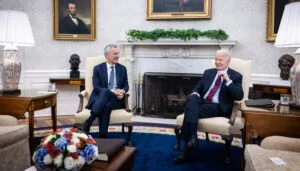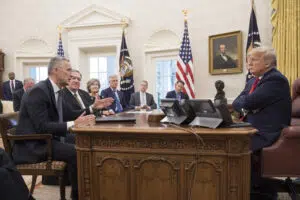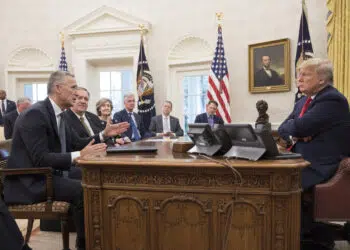Brussels – In February, NATO Secretary Jens Stoltenberg said that the number of Atlantic Alliance members able to meet the 2 percent target for defense spending relative to GDP would rise to 18. Only four months later, the new Defense Expenditure of NATO Countries (2014-2024) report released late yesterday evening (June 17) shows that there are 23 out of 32 countries that have exceeded the minimum threshold (Iceland is excluded from the statistics, as is the only member without an army), up from 11 in 2023. Italy is now in the minority – one of 8 members below the bar -with 1.49 percent in defense spending, up 0.3 percentage points in the last year.

“European allies and Canada are stepping up the effort and assuming their share of joint responsibility in protecting all of us,” NATO Secretary General Jens Stoltenberg said to U.S. President Joe Biden during yesterday’s White House conversation, which took stock of the Atlantic Alliance’s spending targets. The numbers of the 2024 show that of the 23 NATO countries above the 2 percent target, 16 are also EU members (Bulgaria, Denmark, Estonia, Finland, France, Germany, Greece, Latvia, Lithuania, Netherlands, Poland, Czech Republic, Romania, Slovakia, Sweden, and Hungary), while four are candidates for EU membership (Albania, North Macedonia, Montenegro, and Turkey). Given that Austria, Cyprus, Ireland, and Malta are not part of the Atlantic Alliance, there are seven other EU member states still not aligned (besides Italy, Belgium, Croatia, Luxembourg, Portugal, Slovenia, and Spain) along with Canada (with 1.37 percent). Of the NATO members that now meet the minimum criteria for defense spending on GDP, four are above 3 percent (Greece, Latvia, the United States, and Estonia), and Poland reaches 4.12 percent.
Trump-NATO tensions over military spending
With U.S. Presidential elections just a few months away, the harsh words of the former President and probable Republican candidate Donald Trump against NATO’s 31 other allies, on February 10 during a rally in South Carolina, still resounds ominously at NATO. Recalling his years as President of the United States, Trump revealed that “one of the leaders of a large country asked ‘If we don’t pay up and we are attacked by Russia, will you protect us?’, and I replied ‘You haven’t paid up, we’re not going to protect you. I would encourage them [the Russians, ed] to do whatever the hell they want to you.” A disturbing prospect given a possible re-election of The Donald to the White House for the risks of future conflict extension in Europe.

NATO Secretary Stoltenberg shot back, warning that “we must not undermine the NATO deterrence we are investing in, including in the way we communicate,” especially given the need “to leave no room for Moscow to miscalculate and misunderstand our resolve to defend ourselves.” On the contrary, “any suggestion that we will not protect ourselves puts us all at risk,” and this is not a matter of secondary importance for Washington either: “They have never fought a war on their own without NATO allies, from Korea to Afghanistan, and the only time we resorted to Article 5 was for an attack on the United States.” Moreover, Stoltenberg was clear that the more the U.S. is “concerned about China, the more they need a strong NATO.”
English version by the Translation Service of Withub





